#Delhi Education Reforms
Text
10.5 करोड़ का Injection : Delhi के CM Arvind Kejriwal के द्वारा Kanav को मिला नया जीवन
परिवार ने नहीं मानी हार, बच्चे के लिए ले आए इंजेक्शन, अब हालत में सुधार
Spinal Muscular Atrophy (SMA) यह एक जेनेटिक बीमारी है। माता-पिता से बच्चों में आती है। Kanav को भी यह जानलेवा बीमारी माता-पिता से मिल गई। पिता अमित जांगरा अपने पहले बच्चे की खुशी भी नहीं मना पाए थे कि इस बीमारी ने उनकी सारी खुशियां छीन लीं। बच्चे के शरीर के निचले हिस्से के मसल्स कमजोर होने लगे। इलाज शुरू हुआ तो डॉक्टर ने जीन…
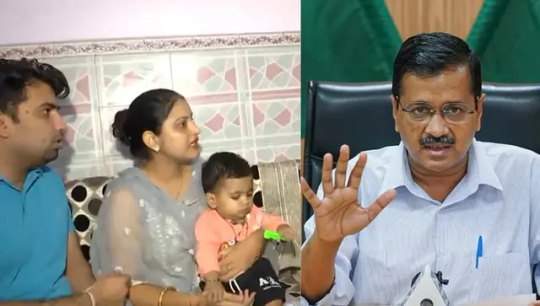
View On WordPress
#AAP (Aam Aadmi Party)#Arvind Kejriwal#Arvind Kejriwal Achievements#Arvind Kejriwal Interviews#Arvind Kejriwal Press Conference#Arvind Kejriwal Speech#Arvind Kejriwal Updates#Delhi Chief Minister#Delhi Education Reforms#Delhi Elections#Delhi Governance#Delhi Government#Delhi Pollution Control#Health Initiatives in Delhi#Indian Politics#Kanav#Kanav Jangra#Kejriwal News#Kejriwal Policies#Kejriwal&039;s Vision for Delhi#Political Developments
1 note
·
View note
Text
Implications of Delhi High Court's Scrutiny on Education: AAP's Model Under Review #BlogchatterA2Z
Implications of Delhi High Court's Scrutiny on Education: AAP's Model Under Review #BlogchatterA2Z #DelhiEducation #AAPReforms #HighCourtScrutiny #PublicSchools #EducationChallenges
Amidst the bustling streets and political fervor of Delhi, the recent scrutiny by the Delhi High Court on the education model championed by the Aam Aadmi Party (AAP) has cast a stark light on the lamentable state of schools in the capital. With scathing rebukes and pointed admonitions, the court directed its ire towards the Education Secretary, lambasting the tendency to rely on superficial…

View On WordPress
0 notes
Text
"As an environmentalist, I am very concerned about the fragile and sensitive ecosystem of Ladakh,” said Magsaysay Award-winning educationist Sonam Wangchuk, who recently concluded his 21-day hunger strike in Leh. Popularly known as 'climate fast', Wangchuk had begun observing it on 6 March, demanding constitutional safeguards for Ladakh.
On the final day of his fast on 26 March, Wangchuk said that the people of Ladakh are trying to awaken the conscience of Prime Minister Narendra Modi and Home Minister Amit Shah so that they take suitable action to safeguard the fragile ecosystem of Himalayan mountains in Ladakh and preserve the unique indigenous tribal culture.
“We don’t like to think of Modi ji and Amit Shah ji as just politicians, we would rather think of them as statesmen but for that, they will have to show some character and farsightedness…” he posted on X.
Wangchuk had become the face of a sustained agitation in the cold desert where people are up in arms against the central government for discarding their concerns regarding land and job rights.
"Every drop of water is important here. Ladakh can't support large numbers. It will make refugees out of locals and even for those who arrive, the situation would not be any good. That's the fear people have regarding the fate of our land and our culture – finely tuned over tens or even thousands of years to survive in these mountains, now at risk of dilution and unable to sustain itself,” he added.
However, this was not the first time that Wangchuk had undertaken a climate fast:
In January 2023, he undertook a five-day climate fast at his institution, the Himalayan Institute of Alternatives (HIAL) in Ladakh at -20 degrees Celsius.
In June 2023, Wangchuk again went on a nine-day climate fast to save "Ladakh’s fragile ecology."
The Ecological Connection to Ladakh’s Demands
Ladakh is a high-altitude desert inhabited by around 3 lakh people. The region is considered ecologically fragile due to its extreme climate conditions, scarce vegetation, and limited water resources. Most people are dependent on agriculture as a means of livelihood.
A separate territory was a long-pending demand of the Ladakhis but they were expecting one with constitutional safeguards – somethingthat was categorically denied by the Bharatiya Janata Party (BJP)-led government earlier this month.
Their land and job rights were taken away with the Abrogation of Article 370 on 5 August 2019, and the region was thrown open to people from other states.
Sensing that New Delhi is not in any mood to extend the Sixth Schedule that would safeguard the region and grant limited autonomy to the tribal region, the engineer-turned-educational reformer had announced a "climate fast” back in 2023 in a bid to turn attention towards the region's delicate ecology.
Speaking to The Quint, Wangchuk said that global warming has been melting glaciers in the Himalayan region where Ladakh is located. He also added that shifting weather patterns are resulting in frequent flash floods, landslides, and droughts that are impacting the lives of people living in the sparsely populated villages of the region.
"We are protesting to safeguard the mountains of the Himalayan region from indiscriminate exploitation and mining which have already wreaked havoc in places like Uttarakhand, Himachal Pradesh, and even Sikkim. All these activities are now poised to impact Ladakh,” he added.
Wangchuk’s Relentless Efforts To Save Ladakh: The ‘Third Pole’ of the Planet
Lately, the glaciers are receding fast and many sectors in Northern India rely on them.
Wangchuk said that Ladakh, which is home to an extensive glacial system, is known as the "Third pole of the planet." It feeds two billion people directly or indirectly.
"If mining industries are introduced in these areas, not only will the local communities suffer, but the entire Northern Indian plains will face water shortages. Therefore, it is crucial that we safeguard these fragile regions as sacred zones of water,” he said.
"For the local people, it's about protecting their region, customs, culture, and land –all of which are enshrined in the Sixth Schedule of the Constitution, as our forefathers have established 75 years ago," Wangchuk added.
Back in 2015, Wangchuk had invented the 'Ice Stupa', an artificial glacier created by piping mountain streams to tackle the water crisis in Ladakh which faces water scarcity in April-May – the peak farming season.
Since then, the farmers in Leh have benefitted from such Ice Stupas.
Not only that, in 2021, Wangchuk whose life inspired a character in the Bollywood movie 3 Idiots, developed an eco-friendly solar-heated tent that Army personnel can use in extremely cold places like Siachen and Galwan Valley in the Ladakh region.
How Will the Sixth Schedule Save Ladakh’s Ecology?
For the Sixth Schedule to be applicable, the Constitution mandates that a region's population must consist of at least 50 percent of tribal communities. In Ladakh, around 97 percent of its population are tribals.
Wangchuk asserted that they are trying to do everything possible to safeguard the mountains.
"The Sixth Schedule of Article 244, which gives safeguards to these regions, the people, and their cultures where they can determine how these places should be developed without interference from others,” he said. "This is what Ladakh has been demanding for a long time before it was made into a Union Territory (UT)," he added.
Notably, the Sixth Schedule contains provisions that grant indigenous tribes significant autonomy, enabling the establishment of Autonomous District Councils (ADCs) with legislative and judicial authority. These councils are empowered to enact regulations concerning various aspects such as land, forest, water, agriculture, health, sanitation, mining, and beyond.
"That was our hope which later turned into uncertainty when the government, as generously as it granted Union Territory status to Ladakh, promised that Ladakh would be safeguarded under the Sixth Schedule but did not fulfil it,” Wangchuk said.
He further argued that if Ladakh is left free for all with no safeguards, there will be mining companies coming. "We hear often they are scouting the mountains and valleys," Wangchuk said, adding that people are apprehensive that huge hotel chains will come up, each potentially bringing in thousands of visitors, that will pose threats to the dry desert ecology of Ladakh.
'The BJP Needs To Keep Its Promise’
Wangchuk said that the BJP needs to fulfil its promise that they made during the 2019 Lok Sabha Elections regarding the “Declaration of Ladakh under the Sixth schedule of the Indian Constitution."
"It's like giving a cheque and if the cheque bounces, then we don't care. Hence, what happens to Ladakh with this promise will set a precedent to the rest of India in all elections to come whether leaders can just say anything and not care later and also get away with it,” he added.
36 notes
·
View notes
Text
Two-Day National Seminar sponsored by ICSSR
KCCILHE hosted a two-day National Seminar sponsored by ICSSR on “The New Education Policy and Education Reforms: Rethinking Curriculum, Research, and Global Engagement.” The aim was to foster discussions on diverse perspectives related to the National Education Policy 2020. The National Seminar was honored by the presence of distinguished guests, including Shri Rajiv Kumar, Former Deputy Director General and Chief Producers News & Current Affairs, Doordarshan, and Dr. Durgesh Tripathi, Professor, Guru Gobind Singh Indraprastha University, New Delhi.
The seminar delved into key issues, encompassing Curriculum Development and Innovation, Research Strategies, Global Engagement in Education, Teacher Professional Development, Technology Integration in Education, NEP Implementation and Evaluation, Inclusivity and Equity in Education, Student-Centered Learning, Quality Assurance in Education, and Higher Education Reforms. Participants from across India presented their research papers in four technical sessions. The overall success of the seminar lay in the fruitful exchange of viewpoints and mutual learning.

11 notes
·
View notes
Text
Are there any Indian lesbians?
Sexual orientation is a human experience so people from any race can be homosexual.
Dutee Chand: She’s an Indian professional sprinter. Her sports accolades are many but she was recently applauded for coming out publicly. She declared that she was in a same-sex relationship. She is now, India’s first and only openly gay athlete.
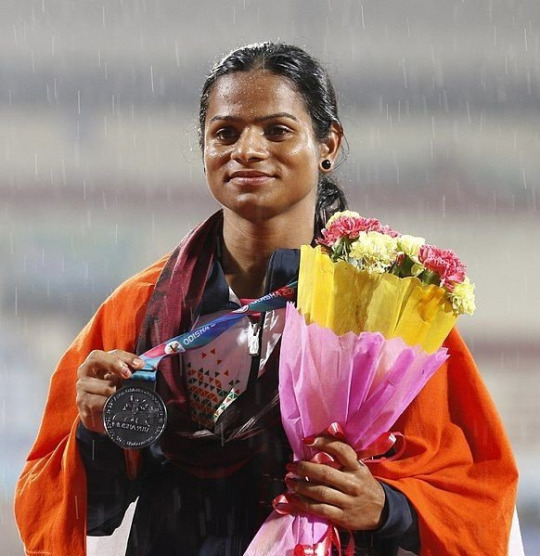
Vasu Primlani: Vasu Primlani is an environmentalist and India’s first openly gay comedian. She is also the recipient of the 2015 Nari Shakti Puruskar by the Government of India. Even though being gay puts her at odds with the law, she has never shirked away from her sexuality in her gigs.

Nina Chaubal: Chaubal grew up in Mumbai, India. At 13 years old, she discovered the word 'transgender' and realized it described her. She found a connection with other trans people through the internet.

Menaka Guruswamy: She is known for having played a significant role in many landmark cases before the Supreme Court, including the Section 377 case, the case of the bureaucratic reform, the Augusta Westland bribery case, the Salwa Judum case, and the Right to Education case. She is assisting the Supreme Court as Amicus Curie in the case pertaining to the alleged extrajudicial killings of 1,528 persons in Manipur.
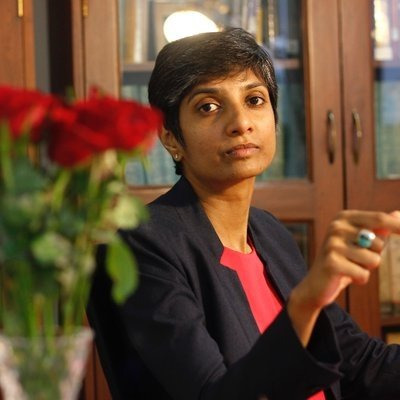
Arundhati Katju: Arundhati Katju is a lawyer qualified to practice in India and New York. She has litigated many notable cases at the Supreme Court of India and the Delhi High Court, including the Section 377 case, the case of a trans man being illegally confined by his parents, the Augusta Westland bribery case, the 2G spectrum corruption case, and the Jessica Lal murder case. Her law practice encompasses white-collar defense, general civil litigation, and public interest cases.
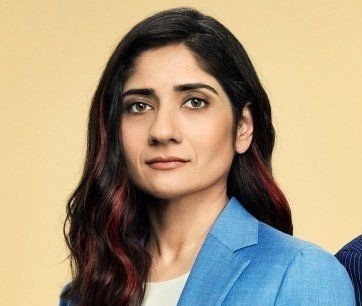
#article 377#lgbtq community#lgbtq#lesbian#queer#nonbinary#lgbtqia#sapphic#nonbinary lesbian#gay girls#lgbt pride#377a#377k#india market#indianfood#the times of india: latest news india#modi#delhi#maharashtra#lesbian art#wlw#bisexual#biseuxal#wlw ns/fw#wlw pride#wlw books#wlw community#wlw love#wlw positivity#wlw nsft
157 notes
·
View notes
Text
Navigating Immigration Law: What You
Need to Know
Navigating immigration law can be a complex and overwhelming process. Whether you're an individual seeking to immigrate to another country or a business looking to hire foreign workers, understanding the intricacies of immigration law is critical to achieving your goals. In this blog, we will discuss some key aspects of immigration law and provide guidance on how to navigate the process successfully.
Types of Immigration Visas
There are several types of immigration visas available depending on the purpose of your visit. These include tourist visas, work visas, family visas, student visas, and immigrant visas. Each visa has its own set of requirements and procedures, and it's important to understand which visa is appropriate for your situation.
Requirements for Immigration
The requirements for immigration vary depending on the type of visa you are applying for.For example, work visas require proof of a job offer from a U.S. employer, while student visas require proof of enrollment at an accredited educational institution. In addition to these requirements, there are several other factors that can impact your eligibility for immigration,including criminal history and medical conditions.
The Immigration Process
The immigration process involves several steps, including submitting an application,attending an interview, and providing documentation to support your eligibility for a visa. The process can be time-consuming and complex, and it's important to work with an experienced CAT law firm in Delhi that specialises in immigration law to guide you through the process.
Service Issues
It's important to note that immigration law is constantly evolving, and there may be changes to the requirements and procedures for immigration visas. In addition, service issues can arise during the immigration process, such as delays in processing or denials of applications. Working with an experienced immigration lawyer can help you navigate these issues and ensure that your application is submitted correctly.
Immigration Reform
Immigration reform is a topic that is frequently discussed in political circles, and changes to immigration laws can have a significant impact on the immigration process. It's important tstay informed about any changes to immigration laws that could impact your eligibility for a visa. In conclusion Navigating immigration law can be a complex process that requires careful attention to detail and expertise in the field. By working with experienced CAT lawyers in Delhi that specialises in immigration law, you can ensure that you have the guidance and support you need to navigate the process successfully. Whether you're an individual seeking to immigrate to another country or a business looking to hire foreign workers, understanding the intricacies of immigration law is critical to achieving your goals. By staying informed about the requirements, procedures, and potential service issues associated with immigration, you can take the necessary steps to achieve your immigration goals.
2 notes
·
View notes
Text
Unlocking Success: Adharshila Academy – The Premier Coaching Institute in East Delhi
In the bustling streets of East Delhi lies a beacon of academic excellence - Adharshila Academy. With a proud legacy spanning over two decades, Adharshila stands tall as one of the most reputable coaching institutes, nurturing students to conquer the challenges of Engineering and Medical entrance exams, alongside excelling in board examinations.
Best Coaching Centre in Acharya Niketan: Adharshila Academy's Distinctive Approach
Located in the heart of Acharya Niketan, Adharshila Academy emerges as the undisputed leader in providing comprehensive coaching for various competitive exams. With a dedicated faculty and state-of-the-art infrastructure, students find themselves immersed in an environment conducive to learning and growth.
Best JEE Coaching in Mayur Vihar: Achieve Your IIT Dreams with Adharshila Academy
Mayur Vihar resonates with the aspirations of countless young minds dreaming of cracking the prestigious IIT-JEE exams. At Adharshila Academy, these dreams find wings to soar. Our meticulously designed courses, aligned with the latest trends and requirements, ensure that students are well-prepared to tackle the toughest of challenges.
PCM Coaching in Vinod Vihar: Building Strong Foundations for Engineering Aspirants
In the pursuit of engineering excellence, a strong foundation in Physics, Chemistry, and Mathematics (PCM) is paramount. Adharshila Academy, situated in Vinod Vihar, offers specialized PCM coaching, catering to the specific needs of aspiring engineers. Our expert faculty and comprehensive study materials empower students to master these fundamental subjects with ease.
Tuition Centre in Mayur Vihar: Personalized Attention for Academic Excellence
Recognizing the diverse learning needs of students, Adharshila Academy goes beyond conventional methods by offering personalized tuition support. In the bustling hub of Mayur Vihar, our tuition center becomes a sanctuary for students seeking individualized attention and guidance. Whether it's clarifying doubts or reinforcing concepts, our mentors are dedicated to nurturing each student's potential.
JEE Coaching in Delhi: Embracing the NEP 2020 Vision
With the dawn of the New Education Policy (NEP) 2020, Adharshila Academy stands at the forefront of educational innovation. Our courses are meticulously crafted in accordance with the NEP guidelines, ensuring that students not only excel in examinations but also develop a holistic understanding of their subjects. Interactive learning methodologies and experiential teaching techniques further enhance the educational experience at Adharshila. In conclusion, Adharshila Academy epitomizes excellence in coaching, offering a holistic approach towards academic success. Whether it's achieving mastery in PCM subjects, cracking competitive exams like IIT-JEE and NEET-UG, or excelling in board examinations, Adharshila provides the perfect platform for students to realize their dreams. With its strategic locations across East Delhi and a commitment to embracing educational reforms, Adharshila Academy continues to be the
0 notes
Text
Usage of digital marketing steps to provide education to all sector’s people
One question arises in users’ minds how to overcome poverty, especially for specific groups. One should use their right to achieve their education to improve their literacy rate. Getting a basic level of education is not difficult as it does not have the heavy charge to your education providers. If you keep the social reforming though and want to execute it in reality, then you focus on providing easy accessibility of education. Suppose, you are running a coaching center in a particular city to educate students well. Then, you are doing your best to bring education hopes into their life.
But, it is the obvious question of how can provide a great role to widen the knowledge to the great masses. It does not matter whether they belong to a high or low society group. In this sky-scrapping rate, you cannot below below-average fees in exchange for providing a better education. The unwanted infrastructures impose to keep some definite price. If you replace the high fee-oriented education with affordable fees via digital marketing, you can do something better to transit the better education possibility. There is no wonder to say that you should take the association of the digital marketing trend to invite the desired student to get an education.

Choose the perfect digital marketing for online education
With the implementation of this concept, the fee is not a big hindrance to retaining the education. If you want to achieve the goal of government and public sector jobs, then online education is the convenient medium to access education anywhere. To translate offline education into online, you can meet with reliable digital marketing. They have a basic digital marketing plan to achieve the digital marketing trend with us.
Understand your business requirements: If you have the zeal to provide education to all income groups, then you never leave the attempt to make an online identity. For instance, you make sure how can your competitors are ahead of you. After all, you know what online marketing should take into action to abreast your education competitors chain.
Create the organic traffic: The first and foremost thing to convert your education business into a simple one is to build the website. Apart from this, you pay attention to the concern that loading your website does not take more time. Do not dive into stupid on-page and off-page practices that lead your business to the end stage. But, you must keep in mind that online traffic does not come into practice in one day.
Pay attention to paid ads: If you want to run temporary and quick visibility for any educational entity, then paid ads are worth it for you. The association with a reliable company helps a lot to create ads that resonate with the targeted audience.
Conclusion: Do not lose hope if you do not have the idea to end your query for running digital marketing ads. Then you do not think more and end your search at One Marketing Tek. The properly devised digital marketing plan is perfect for grooming your presence educational digital marketing professional. So, you have created effective business leads for many professionals and get the credit of the best Digital Marketing Agency for educational institutes for Delhi. So, you should describe your specifications and how you can track your targeted audience.
Source Url:
#Educational Digital Marketing Agency#Digital marketing for educational institutes#Digital marketing for coaching#SEO services for coaching.
0 notes
Text
Education events India 2024
In 2024, India presents a dynamic lineup of education events encompassing fields like STEM, arts, and humanities. From national conferences on educational reform to international symposiums on innovation in learning, these events serve as platforms for collaboration, knowledge sharing, and professional development, shaping the future of education in India and beyond.
August 30–31, 2024
Venue : JW Marriott Aerocity, New Delhi
Read for more info: https://www.eduversesummit.org/eduverse-india/
0 notes
Text
Advocating Digital Safety: Advocate Deepak, the Cyber Crime Lawyer in Delhi
Introduction
In an age dominated by digital interactions, the rise of cybercrime presents a pressing concern for individuals and businesses alike. Cyber threats such as hacking, identity theft, online fraud, and data breaches have become increasingly sophisticated, highlighting the need for expert legal counsel to navigate this complex landscape. Advocate Deepak, a prominent Cyber Crime Lawyer in Delhi, emerges as a beacon of defense in safeguarding digital spaces. This blog explores Advocate Deepak's role in combating cybercrime, his approach to cyber law, notable cases, and the impact of his work in ensuring digital safety.
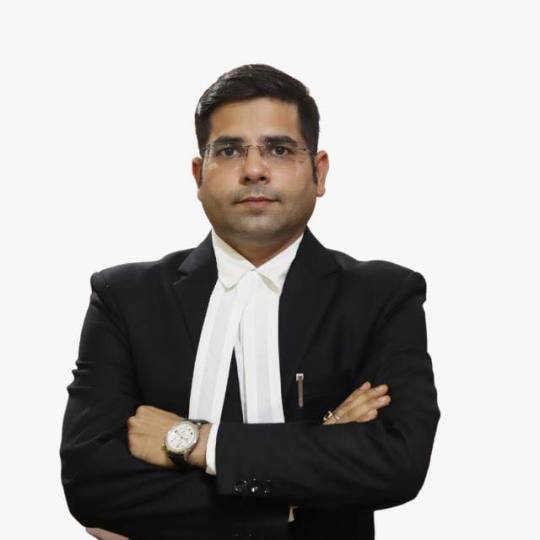
Understanding Cyber Crime
Cybercrime encompasses a broad spectrum of illegal activities conducted through digital channels, targeting sensitive information and digital assets. With the proliferation of digital platforms, cybercriminals exploit vulnerabilities in cybersecurity frameworks to perpetrate unlawful activities. This includes unauthorized access to computer systems, financial fraud, online harassment, and more. The prevalence of cybercrime underscores the critical need for legal expertise in addressing these challenges effectively.
The Role of a Cyber Crime Lawyer
As a Cyber Crime Lawyer, Advocate Deepak plays a pivotal role in defending the rights of individuals and businesses affected by cyber threats. His responsibilities include providing legal counsel, representing clients in legal proceedings, conducting investigations, and advocating for legislative reforms to strengthen cyber laws. Advocate Deepak's expertise in cyber law equips him to navigate complex legal challenges and secure favorable outcomes for his clients.
Advocate Deepak's Expertise
With a wealth of experience in cyber law, Advocate Deepak possesses a deep understanding of the legal frameworks governing cybercrime. His expertise extends to various aspects of cyber law, including data protection, electronic transactions, intellectual property rights, and cyber forensics. Advocate Deepak's knowledge allows him to provide tailored legal solutions to address the unique needs of his clients effectively.
Approach to Cyber Law
Advocate Deepak adopts a client-centric approach to cyber law, prioritizing clear communication, empathy, and integrity in his interactions with clients. He strives to understand the specific challenges faced by his clients and develops personalized legal strategies to address their concerns. Advocate Deepak's approach is characterized by meticulous attention to detail, strategic thinking, and a commitment to upholding the principles of justice and fairness.
Notable Cases
Throughout his career, Advocate Deepak has handled numerous high-profile cybercrime cases, earning recognition for his legal acumen and dedication to his clients' interests. From representing victims of online fraud to defending businesses against data breaches, Advocate Deepak has successfully navigated complex legal challenges to secure justice for his clients. His notable cases serve as a testament to his expertise and unwavering commitment to upholding the rule of law in the digital domain.
The Impact of Advocate Deepak's Work
Advocate Deepak's work extends beyond individual cases, contributing to broader efforts aimed at combating cybercrime and enhancing digital security. Through his advocacy and legal expertise, Advocate Deepak raises awareness about cyber threats, educates clients about their rights and responsibilities in the digital realm, and advocates for legislative reforms to strengthen cyber laws. His efforts have a tangible impact on enhancing cybersecurity frameworks, protecting digital assets, and safeguarding individuals and businesses from cyber threats.
Conclusion
In conclusion, Advocate Deepak emerges as a stalwart defender in the fight against cybercrime, championing digital safety and protecting the rights of individuals and businesses in an increasingly digitized world. His expertise, client-centric approach, and unwavering dedication to justice position him as a trusted ally for those navigating the complex legal landscape of cybercrime. Advocate Deepak's contributions play a pivotal role in ensuring digital security, upholding the rule of law, and safeguarding the rights of individuals and businesses against cyber threats.Vist: https://bestcybercrimelawyer.in/cyber-crime-lawyer-in-delhi/
1 note
·
View note
Text
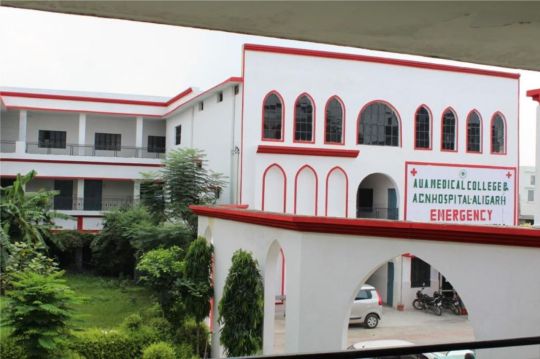
Aligarh Ayurvedic Medical College & ACN Hospital is a premier institution for Under Graduate education of Ayurvedic system of medicine in the Indian Subcontinent, especially in U.P. It is one of the best private Ayurvedic College recognized by the Govt. of India and Govt of U.P, under the NCISM and Ministery of Ayush Govt of India. It was established in 1993 under the leadership of Mr. R.A. Chaudhary who is a renowned educationist and an Alumni of A.M.U. From his first day in AMU Mr Chaudhary is extremely inspired with the vision of the great reformer and revolutionist Sir Syed Ahmad Khan.Ayurvedic System of Medicine in Indian Subcontinent is safest, affordable and most acceptable traditional system of Medicine.The basic aim of this college to produce well trained and Skillful Ayurvedic Doctors, who will take part in the healthcare service of our country and service of mankind. There are 60 UG seats with the name of BAMS (Bachelor of Ayurvedic Medicine and Surgery) in our Institution.
Approved by U.P Gov, Recognised by Ministary of Ayush, Government of India & NCISM, New Delhi, Affiliated to Mahayogi Guru Gorakhnath AYUSH University
For Admission Query
0 notes
Text
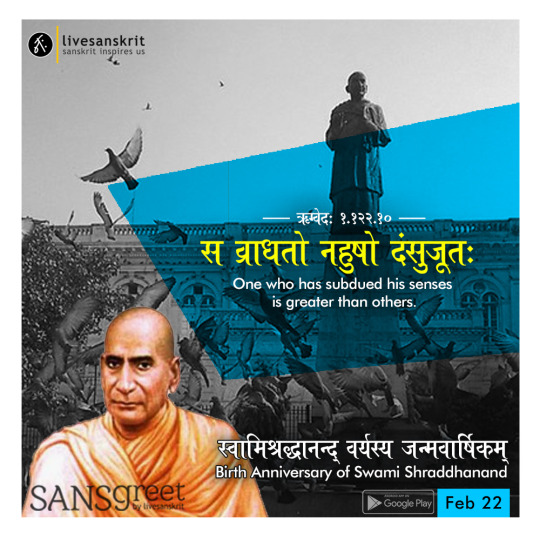
Send from Sansgreet Android App. Sanskrit greetings app from team @livesanskrit .
It's the first Android app for sending @sanskrit greetings. Download app from https://livesanskrit.com/sansgreet
Swami Shraddhanand
Swami Shraddhanand (22 February 1856 – 23 December 1926), also known as Mahatma Munshi Ram Vij, was an Indian Independence activist and an Arya Samaj sannyasi who propagated the teachings of Dayananda Saraswati. This included the establishment of educational institutions, like the Gurukul Kangri University, and played a key role on the Sangathan (consolidation and organization) and the Shuddhi (purification), a Hindu reform movement in the 1920s.
#sansgreet #sanskritgreetings #greetingsinsanskrit #sanskritquotes #sanskritthoughts #emergingsanskrit #sanskrittrends #trendsinsanskrit #livesanskrit #sanskritlanguage #sanskritlove #sanskritdailyquotes #sanskritdailythoughts #sanskrit #resanskrit #swamisraddhanand #independanceactivist #aryasamaj #sadhu #sanyasi #gurukulkangrivishwavidyalaya #hindureform #jalandhar #punjab #delhi #socialworker #freedomfighter #teacher #socialreformer #celebratingsanskrit
#greetingsinsanskrit#sanskritgreetings#sanskrittrends#trendsinsanskrit#livesanskrit#sanskrit#celebratingsanskrit#incredibleindia
0 notes
Text
Women Empowerment NGO In India
In the global pursuit of gender equality and women's empowerment, non-governmental organizations (NGOs) play a pivotal role in advocating for women's rights and implementing initiatives that uplift women and girls. Among these organizations, Global Women's Initiative (GWI) stands out as a beacon of hope and change. CSR NGO In Delhi Committed to promoting gender equality, empowering women economically, socially, and politically, GWI has emerged as a leading force in women's empowerment efforts worldwide. Through its comprehensive programs, advocacy campaigns, and grassroots initiatives, GWI is making a tangible difference in the lives of women and girls globally.
GWI's Mission and Approach:
At the heart of GWI's mission is the vision of a world where women and girls have equal opportunities, rights, and access to resources. The organization is dedicated to empowering women through education, economic opportunities, leadership development, and advocacy for gender equality. Best NGO For Women Empowerment In India GWI adopts a multi-faceted approach that addresses the root causes of gender inequality, promotes women's rights, and fosters inclusive development.
Key Initiatives and Programs:
GWI's impactful initiatives encompass a wide range of programs aimed at empowering women and girls:
Economic Empowerment: GWI provides financial literacy training, access to microcredit, and entrepreneurship development programs to support women's economic empowerment. By equipping women with the skills, resources, and opportunities to start and grow businesses, GWI helps them achieve financial independence and improve their livelihoods. Top 10 NGO In Delhi
Education and Skill Development: GWI promotes girls' education and women's literacy through scholarships, mentorship programs, and vocational training initiatives. By investing in education and skill development, GWI empowers women to break the cycle of poverty, pursue higher education, and access better employment opportunities.
Leadership and Political Participation: GWI offers leadership training, networking opportunities, and mentorship programs to empower women to take on leadership roles in their communities and participate in decision-making processes. By promoting women's leadership and political participation, GWI works to ensure that women's voices are heard and their interests are represented in governance and policymaking.
Advocacy and Awareness: GWI advocates for policy reforms, legal protections, and social changes that promote gender equality and women's rights. Through advocacy campaigns, research, and public awareness initiatives, GWI raises awareness about gender-based discrimination, violence against women, and the importance of women's empowerment for sustainable development.
Impact and Success Stories:
GWI's commitment to women's empowerment has led to significant impact and positive change:
Economic Empowerment: GWI has supported thousands of women entrepreneurs, leading to increased incomes, job creation, and economic growth in communities around the world.
Education: GWI has improved access to education for girls and women, resulting in higher enrollment rates, improved academic performance, and increased opportunities for higher education and employment.
Leadership: GWI has empowered women to assume leadership roles in their communities, leading to improved governance, increased representation of women in decision-making bodies, and greater social and economic development. Donate Child Education
Conclusion:
Global Women's Initiative (GWI) exemplifies the transformative power of women's empowerment in creating a more equitable, inclusive, and sustainable world. Through its holistic approach to women's empowerment, GWI is breaking down barriers, building resilience, and unlocking the potential of women and girls to drive positive change in their communities and beyond. By supporting GWI's women empowerment initiatives, individuals and organizations can contribute to the advancement of gender equality and the realization of human rights for all.
0 notes
Text
National Seminar on Aatamnirbhar Bharat and Sabka Prayas
KCC Institute of Legal and Higher Education, Gr Noida organised Two-Day ICSSR sponsored National Seminar on Aatamnirbhar Bharat and Sabka Prayas on 11-12 Nov 2022.
India has set a goal of building Aatmanirbhar Bharat till it celebrates 100 years of India’s Independence and this could be possible only by the contribution of everyone’s efforts. This Seminar gave forum to all participants to analyze the measures undertaken by the Government and their impact on society. The main objective of this Seminar was to discuss issues which are obstacles in getting involvement and commitment of everyone towards making of Self Reliant India.
Major key issues which were point of discussion were One Nation One Ration Card, Unifying Agricultural Markets, National Education Policy,Ek Bharat Shreshtha Bharat, Ayushman Bharat, E-Mobility, Waste Management, Renewable Energy Expansion, Space Technology and Its Application, Medical Devices, Equipment and Technological Advancement ,Tax Reforms and other related issues.
Veledictory Session on 12 Nov was graced by Dr. Durgesh Tripathi, Professor, GGSIPU, Mr. AJAY GUPTA, Director (Research), ICSSR, Delhi, Dr. Rajesh Kumar Singh Former, Senior officer, Indian Air Force and Mr. Naresh Saini, Financial Advisor & CAO ICSSR


32 notes
·
View notes
Text
Supreme Court Ruling on Electoral Bond Scheme
This article on 'Supreme Court Ruling On Electoral Bonds Scheme was written by Tosani Lal, an intern at Legal Upanishad.
INTRODUCTION
On February 15,2024, the Supreme Court of India delivered a pivotal judgment in Association for Democratic Reforms v. Union of India, providing a much-needed boost to our democratic principles. The unanimous verdict by five judges, including Chief Justice DY Chandrachud and Justice Sanjiv Khanna, underscored the inherent connection between our right to political equality and the freedom to vote with comprehensive information. The court deemed unconstitutional a set of parliamentary laws that had a profound and adverse impact on India's democratic process.
Furthermore, the Supreme Court upheld a High Court order that directed the Election Commission to acquire and publicly disclose background information about candidates, such as details regarding their assets, criminal records, and educational background. In this context, the court asserted that the right to access information about public officials emanates from the constitutional right to freedom of expression. This dual affirmation by the Supreme Court marks a significant stride towards promoting transparency and safeguarding the democratic principles integral to our nation.
In this article, we will delve into the recent landmark ruling by the Supreme Court of India in the case of Association for Democratic Reforms v. Union of India. By examining the intricacies of the judgment, we aim to provide readers with a comprehensive understanding of the implications of the Supreme Court's stance on Electoral Bonds and its significance in shaping the future of electoral transparency and accountability in the country.
FACTS AND ISSUES OF THE CASE
The Association for Democratic Reforms initiated legal proceedings by filing a comprehensive petition with the High Court of Delhi, aiming to compel the implementation of specific recommendations geared towards bolstering the fairness, transparency, and equity of the electoral process in India.
At the explicit request of the Government of India, these recommendations, meticulously crafted by the Law Commission, articulated that the Election Commission should necessitate all candidates to publicly disclose a comprehensive array of personal background information. This information encompassed crucial details such as criminal history, educational qualifications, personal financial intricacies, and other pertinent data necessary for a nuanced evaluation of a candidate's capacity and capability to serve in public office.
In a landmark ruling that underscored the imperative of transparency in a democratic system, the High Court of Delhi pronounced that withholding a candidate's background information was contrary to the interests of democracy. Consequently, the court mandated the Election Commission to actively procure and disseminate such information for the enlightenment of voters.
However, this directive faced opposition from the Union of India, prompting them to challenge the decision through an appeal presented to the Supreme Court of India. The Union argued that neither the Election Commission nor the High Court possessed the constitutional authority to compel the disclosure of such extensive personal information, contending that voters did not have an inherent right to such comprehensive disclosure.

Supreme Court Ruling On Electoral Bonds: Association for Democratic Reforms v. Union of India 2024
Within the ambit of this legal dispute, the Supreme Court identified and deliberated upon two pivotal issues. First and foremost, the Court examined whether the maintenance of secrecy concerning the identity of political contributors and the extent of their contributions would infringe upon the fundamental right to information.
Secondly, the Court probed into the potential ramifications of limitless corporate funding, scrutinizing whether such an approach would transgress the foundational principles of free and fair elections and, in turn, violate the right to equality. This multifaceted legal discourse seeks to unravel the intricate intersection of electoral transparency, democratic principles, and constitutional rights within the Indian context.
ANALYSIS OF THE DECISION
Before the Court were challenges to amendments brought about by the Finance Act, 2017, impacting various statutes, such as the Representation of the People Act, 1951, the Income Tax Act, 1961, and the Companies Act, 2013. These changes introduced a novel financial contribution mechanism for political parties known as the "Electoral Bond Scheme."
Under the modified law, individuals or any "artificial juridical person," including corporations, could acquire bonds issued by the State Bank of India during specified periods. These bonds, similar to promissory notes, were available in denominations ranging from Rs. 1,000 to Rs. 1 crore. Upon obtaining a bond, a buyer could donate it to any political party of their choosing, with the party having the ability to redeem the instrument on demand. Notably, recipients were not required to disclose these contributions, allowing donors to keep the details of their contributions private.

Additionally, the amendments removed crucial safeguards that were in place before. Previously, companies were limited to donating no more than 7.5% of their net profits over the preceding three years, with a requirement that a corporation must exist for at least three years before making a donation. The Electoral Bond Scheme eliminated these constraints, potentially enabling the creation of shell companies for channeling money into politics and facilitating virtually unlimited corporate funding.
The Court identified two key issues for consideration. Firstly, it questioned whether maintaining secrecy over the identity of political contributors and the extent of their contributions would violate the right to information. Secondly, it probed whether unlimited corporate funding would infringe upon the principle of free and fair elections, thereby violating the right to equality.
Addressing the first issue, the Court reaffirmed the longstanding principle that voters in a democracy must have the right to information. Recognizing that candidates must disclose all relevant information, Chief Justice Chandrachud asserted that this standard should extend to political parties, which are integral units in the electoral process.
The Union government argued that the contributor's identity was unknown even to the beneficiary, a claim the Court dismissed. The judgment illustrated situations in which a contributor could physically hand over an electoral bond to a party's office-bearer, who could then submit the instrument for enactment.
Exploring circumstances where the electorate's right to information could be legitimately curtailed, the Court applied a rule of proportionality. The government needed to demonstrate that restricting the right was in pursuit of a legitimate goal, the chosen option was a suitable means, and the measure struck a balance between people's rights and its goals.
Regarding the purported aims of the scheme - curbing black money and protecting donor privacy - the Court found that even if curbing black money was a legitimate purpose, the scheme was disproportionate. Existing measures, such as limiting contributions in cash and mandating contributions above Rs. 2,000 to be made through banking channels, already addressed this concern.
On the second aim, balancing the right to privacy with the electorate's right to information, the Court applied a doctrine of "double proportionality." This involved a three-step process: analyzing the comparative importance of the actual rights claimed, examining the justifications for the infringement of rights, and independently applying the proportionality standard to both rights.

Supreme Court Ruling On Electoral Bonds: Association for Democratic Reforms v. Union of India 2024
Chief Justice Chandrachud acknowledged a modification in the Indian context, involving a four-step proportionality test. The final stage included evaluating the cost of the interference with the right and its proportionality to the law's perceived objective. The Court concluded that the Electoral Bond Scheme failed to harmonize the involved interests.
Examining whether the scheme was "suitable, necessary, and proportionate" to the fundamental rights at stake, the Court ruled that the law failed this test. The Representation of the People Act (RPA) previously mandated disclosure of contributions exceeding Rs. 20,000, preserving privacy rights for individual donors below this threshold. Chief Justice Chandrachud argued that the RPA's alternative achieved the objective of securing disclosure while maintaining privacy.
The Court contended that the balance in the scheme tilted excessively towards donor anonymity, compromising the electorate's right to know how political parties were funded. The judgment highlighted the need for a more thorough reform in electoral funding, while recognizing the decision as a robust defense of the republic's cherished ideals.
CONCLUSION
In summary, the Supreme Court's ruling on the Electoral Bonds Case signifies a crucial development in the debate on political financing in India. The amendments introduced by the Finance Act, 2017, especially the Electoral Bond Scheme, faced scrutiny for its impact on transparency and democratic integrity. Chief Justice Chandrachud emphasized voters' right to information and rejected claims of contributor anonymity.
The Court applied a proportionality test, deeming the scheme disproportionate. It also questioned the scheme's aims of curbing black money and protecting donor privacy, concluding that existing measures addressed concerns effectively. The verdict highlighted the imperative for a more comprehensive electoral funding reform, solidifying the decision as a staunch defense of the republic's fundamental ideals. This calls for a reevaluation of electoral financing mechanisms to align with principles of transparency, accountability, and democratic information rights.
Reference List
Association for Democratic Reforms v. Union of India 2024 LiveLaw (SC) 118
IBID
IBID
IBID
IBID
A Fillip To Democracy : Supreme Court's Electoral Bonds Case Verdict, available at (www.livelaw.in/articles/a-fillip-to-democracy-supreme-courts-electoral-bonds-case-verdict-249803?infinitescroll=1 (last visited 20th february 20, 2024)
Ibid
Ibid
Ibid
Ibid
Ibid
Ibid
Ibid
Ibid
Ibid
Ibid
Ibid
Read the full article
0 notes
Text
Navigating the Legal Landscape: Exploring Law Firms in Delhi
Introduction:
Delhi, the bustling capital city of India, serves as the epicenter of legal affairs, hosting a myriad of law firms catering to diverse clientele. From multinational corporations to individual citizens seeking legal assistance, these law firms play a pivotal role in shaping the legal landscape of the nation. In this discourse, we delve into the intricate fabric of law firms in Delhi, examining their structure, specialties, and contributions to the realm of justice.
Diversity in Legal Specialties:
One of the defining characteristics of law firm in Delhi is their diverse range of legal specialties. Whether it's corporate law, intellectual property rights, litigation, or family law, these firms boast expertise across various legal domains. Some firms specialize in niche areas such as technology law, environmental law, or international arbitration, catering to the evolving needs of clients in a rapidly changing world.
Moreover, many law firms in Delhi offer interdisciplinary services, combining legal expertise with insights from fields like finance, economics, and public policy. This multidisciplinary approach enables them to provide comprehensive solutions to complex legal challenges, thereby enhancing client satisfaction and success rates.
Client-Centric Approach:
Law firm in Delhi prioritize client satisfaction, adopting a client-centric approach in their operations. They recognize the importance of understanding clients' needs, objectives, and constraints to deliver tailored legal solutions effectively. From initial consultations to courtroom representation, these firms maintain open lines of communication with clients, ensuring transparency, trust, and accountability throughout the legal process.
Furthermore, many law firms in Delhi offer personalized services, assigning dedicated teams or attorneys to handle each client's case. This personalized approach fosters strong attorney-client relationships, facilitating better collaboration and yielding favorable outcomes for clients.
Embracing Technology:
In an era of digital transformation, law firm in Delhi embrace technology to streamline their operations and enhance service delivery. From legal research and case management to document automation and virtual hearings, technology enables these firms to optimize efficiency, reduce costs, and improve accessibility for clients.
Many law firms leverage cutting-edge software and tools for tasks such as contract review, e-discovery, and data analytics, empowering them to deliver faster, more accurate legal services. Additionally, the adoption of secure communication platforms and cloud-based solutions ensures seamless collaboration among attorneys and clients, irrespective of geographical barriers.
Contributions to Legal Education and Advocacy:
Beyond client representation, law firms in Delhi actively contribute to legal education and advocacy initiatives. Through pro bono work, legal aid clinics, and educational workshops, these firms strive to promote access to justice and empower marginalized communities.
Moreover, many law firms engage in policy advocacy and law reform efforts, advocating for legislative changes to address societal issues and uphold the rule of law. By participating in public debates, publishing thought leadership articles, and engaging with policymakers, these firms play a vital role in shaping the legal framework and advancing the cause of justice in society.
Conclusion:
In conclusion, law firm in Delhi serve as pillars of the legal profession, offering a wide array of specialized services, adopting client-centric approaches, embracing technology, and contributing to legal education and advocacy. As Delhi continues to evolve as a global hub of commerce and governance, these firms remain instrumental in upholding the principles of justice, fairness, and rule of law, thereby enriching the legal landscape of the nation.
0 notes